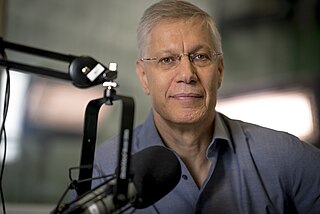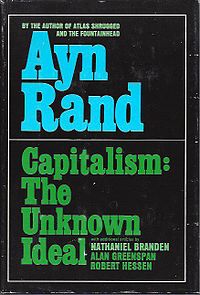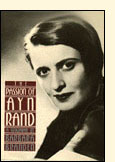Related Research Articles

Alice O'Connor, better known by her pen name Ayn Rand, was a Russian-born American author and philosopher. She is known for her fiction and for developing a philosophical system she named Objectivism. Born and educated in Russia, she moved to the United States in 1926. After two early novels that were initially unsuccessful and two Broadway plays, Rand achieved fame with her 1943 novel The Fountainhead. In 1957, she published her best-selling work, the novel Atlas Shrugged. Afterward, until her death in 1982, she turned to non-fiction to promote her philosophy, publishing her own periodicals and releasing several collections of essays.
Objectivism is a philosophical system named and developed by Russian-American writer and philosopher Ayn Rand. She described it as "the concept of man as a heroic being, with his own happiness as the moral purpose of his life, with productive achievement as his noblest activity, and reason as his only absolute".

Leonard Sylvan Peikoff is a Canadian American philosopher. He is an Objectivist and was a close associate of Ayn Rand, who designated him heir to her estate. He is a former professor of philosophy and host of a nationally syndicated radio talk show. He co-founded the Ayn Rand Institute (ARI) in 1985 and is the author of several books on philosophy.
This is a bibliography for Ayn Rand and Objectivism. Objectivism is a philosophical system initially developed in the 20th century by Rand.
David Christopher Kelley is an American philosopher. He is a professed Objectivist, though his position that Objectivism can be revised and influenced by other schools of thought has prompted disagreements with other Objectivists. Kelley is also an author of several books on philosophy and the founder of The Atlas Society, an institution he established in 1990 after permanently dissociating with Leonard Peikoff and the Ayn Rand Institute.

The Ayn Rand Institute: The Center for the Advancement of Objectivism, commonly known as the Ayn Rand Institute (ARI), is a 501(c)(3) nonprofit think tank in Santa Ana, California, that promotes Objectivism, the philosophy developed by Ayn Rand. The organization was established in 1985, three years after Rand's death, by businessman Ed Snider and Leonard Peikoff, Rand's legal heir.

Peter Schwartz is an American journalist. He is an Objectivist and writes opinion pieces and books from that viewpoint.

Harry Binswanger is an American professor and author. He is an Objectivist and a board member of the Ayn Rand Institute. He was an associate of Ayn Rand, working with her on The Ayn Rand Lexicon and helping her edit the second edition of Rand's Introduction to Objectivist Epistemology. He is the author of How We Know: Epistemology on an Objectivist Foundation (2014).

Objectivism: The Philosophy of Ayn Rand is a 1991 book by the philosopher Leonard Peikoff, in which the author discusses the ideas of his mentor, Ayn Rand. Peikoff describes it as "the first comprehensive statement" of Rand's philosophy, Objectivism. The book is based on a series of lecture courses that Peikoff first gave in 1976 and that Rand publicly endorsed. Peikoff states that only Rand was qualified to write the definitive statement of her philosophic system, and that the book should be seen as an interpretation "by her best student and chosen heir." The book is volume six of the "Ayn Rand Library" series edited by Peikoff.
The Atlas Society (TAS) is an American 501(c)(3) nonprofit organization that promotes the philosophy of Ayn Rand. It is part of the Objectivist movement that split off from the Ayn Rand Institute in 1990 due to disagreements over whether Objectivism was a "closed system" or an "open system". David Kelley is the founder of TAS, and Jennifer Grossman is its current CEO.
The Nathaniel Branden Institute (NBI), originally Nathaniel Branden Lectures, was an organization founded by Nathaniel Branden in 1958 to promote Ayn Rand's philosophy of Objectivism. The institute was responsible for many Objectivist lectures and presentations across the United States. Many of those associated with NBI worked on the Objectivist magazines, The Objectivist Newsletter and The Objectivist.
The Objectivist movement is a movement of individuals who seek to study and advance Objectivism, the philosophy expounded by novelist-philosopher Ayn Rand. The movement began informally in the 1950s and consisted of students who were brought together by their mutual interest in Rand's novel, The Fountainhead. The group, ironically named "The Collective" due to their actual advocacy of individualism, in part consisted of Leonard Peikoff, Nathaniel Branden, Barbara Branden, Alan Greenspan, and Allan Blumenthal. Nathaniel Branden, a young Canadian student who had been greatly inspired by The Fountainhead, became a close confidant and encouraged Rand to expand her philosophy into a formal movement. From this informal beginning in Rand's living room, the movement expanded into a collection of think tanks, academic organizations, and periodicals.
Ayn Rand's philosophy of Objectivism has been, and continues to be, a major influence on the right-libertarian movement, particularly libertarianism in the United States. Many right-libertarians justify their political views using aspects of Objectivism.

Yaron Brook is an Israeli-American entrepreneur, writer, and public intellectual. He is an Objectivist, a former finance professor at Santa Clara University, and the current chairman of the board at the Ayn Rand Institute, where he was executive director from 2000 to 2017. He is also the co-founder of BHZ Capital Management LP.
Ayn Rand, author and developer of Objectivism, held controversial views regarding homosexuality and gender roles. Although Rand personally viewed homosexuality negatively, considering it immoral and disgusting, she endorsed non-discrimination protection for homosexuals in the public sphere while opposing laws against discrimination in the private sector on the basis of individual rights.

Capitalism: The Unknown Ideal is a collection of essays, mostly by the philosopher Ayn Rand, with additional essays by her associates Nathaniel Branden, Alan Greenspan, and Robert Hessen. The authors focus on the moral nature of laissez-faire capitalism and private property. They have a very specific definition of capitalism, a system they regard as broader than simply property rights or free enterprise. It was originally published in 1966.

The New Left: The Anti-Industrial Revolution is a 1971 collection of essays by the philosopher Ayn Rand, in which the author argues that religion, the New Left, and similar forces are irrational and harmful. Most of the essays originally appeared in The Objectivist. A revised edition appeared in 1975, and an expanded edition edited by Peter Schwartz was published in 1999 under the title Return of the Primitive: The Anti-Industrial Revolution.
Objectivist periodicals are a variety of academic journals, magazines, and newsletters with an editorial perspective explicitly based on Ayn Rand's philosophy of Objectivism. Several early Objectivist periodicals were edited by Rand. She later endorsed two periodicals edited by associates, and a number of others have been founded since her death.

The Passion of Ayn Rand is a biography of Ayn Rand by writer and lecturer Barbara Branden, a former friend and business associate. Published by Doubleday in 1986, it was the first full-length biography of Rand and the basis for the 1999 film of the same name starring Helen Mirren as Rand.
Objectivism is a philosophical system created by Ayn Rand that declares real knowledge to be metaphysically objective.
References
Burns, Jennifer (2009). Goddess of the Market: Ayn Rand and the American Right . New York: Oxford University Press. ISBN 978-0-19-532487-7. OCLC 313665028.